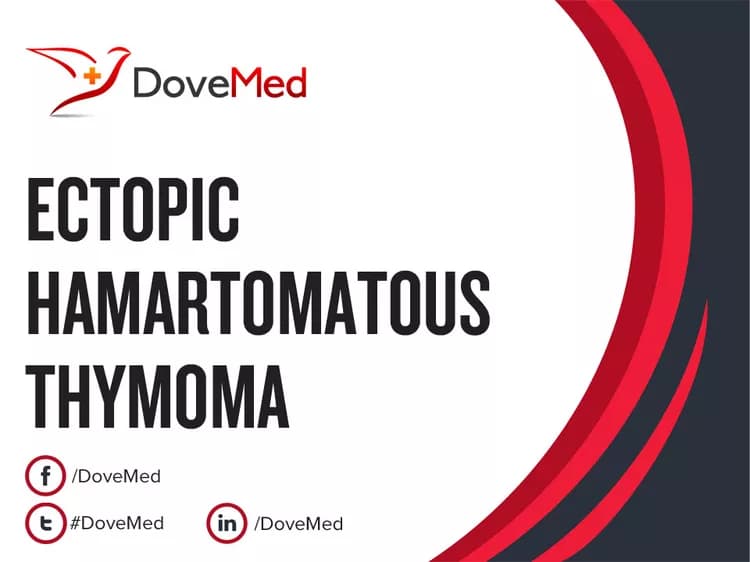What are the other Names for this Condition? (Also known as/Synonyms)
- EHT (Ectopic Hamartomatous Thymoma)
What is Ectopic Hamartomatous Thymoma? (Definition/Background Information)
- Ectopic Hamartomatous Thymoma (EHT) is an infrequent benign tumor of the soft tissues, mostly occurring around the shoulder bones, below the neck
- Generally middle-aged men are prone to this tumor type. The tumors appear as a single, well-defined, long-standing mass, which are painful or painless
- The frequent locations of EHT are the chest walls or the lower neck region
- Complete excision by surgery is curative and the prognosis is excellent
Who gets Ectopic Hamartomatous Thymoma? (Age and Sex Distribution)
- Ectopic Hamartomatous Thymoma is observed with a very high incidence in men, when compared to women. The male to female global incidence ratio of occurrence is 8:1
- They occur in individuals who are in their mid-adult phase (30-50 years old). However, it has also been reported in a wider age group
- There is no known ethnic/racial preference
What are the Risk Factors for Ectopic Hamartomatous Thymoma? (Predisposing Factors)
- No risk factors have been presently identified for Ectopic Hamartomatous Thymoma
It is important to note that having a risk factor does not mean that one will get the condition. A risk factor increases one's chances of getting a condition compared to an individual without the risk factors. Some risk factors are more important than others.
Also, not having a risk factor does not mean that an individual will not get the condition. It is always important to discuss the effect of risk factors with your healthcare provider.
What are the Causes of Ectopic Hamartomatous Thymoma? (Etiology)
- The exact cause and mechanism of Ectopic Hamartomatous Thymoma formation is currently unknown
- It is suggested that for some unspecified reasons, the branchial pouch (body part related to the pharynx), or thymus organ (an organ present in the chest, above the heart) development abnormalities, may be responsible for causing EHT
What are the Signs and Symptoms of Ectopic Hamartomatous Thymoma?
The signs and symptoms of Ectopic Hamartomatous Thymoma may include:
- The presentations may be mild or asymptomatic
- EHT growth occurs over many years (they are slow-growing tumors)
- The benign single nodule generally grows at a very slow rate and appears as well-defined mass with tenderness and pain (sometimes). They may also cause discomfort in the chest and shoulders. The skin over the mass is normal
- EHT, almost always occurs, near the clavicle and sternum region (bones located below the neck, near the shoulder/chest)
- In some cases, multiple lesions have been noted
How is Ectopic Hamartomatous Thymoma Diagnosed?
A diagnosis of Ectopic Hamartomatous Thymoma is made using the following tools:
- Physical examination with evaluation of the individual’s medical history
- Histopathological studies conducted on a biopsy specimen: A pathologist examines the tissue under a microscope before arriving at a definitive diagnosis. A microscopic examination by a pathologist is considered to be a gold standard in tumor diagnosis
- CT scan of chest
- MRI scan of chest (or of the affected region)
Many clinical conditions may have similar signs and symptoms. Your healthcare provider may perform additional tests to rule out other clinical conditions to arrive at a definitive diagnosis.
What are the possible Complications of Ectopic Hamartomatous Thymoma?
The complications from Ectopic Hamartomatous Thymoma could include:
- EHT may affect other organs in the region and constrain them for space
- Damage to vital nerves, blood vessels, and surrounding structures during surgery
- Recurrence after surgery; however, this is reported to be a very rare event
How is Ectopic Hamartomatous Thymoma Treated?
Treatment measures for Ectopic Hamartomatous Thymoma (EHT) may include the following:
- If there are no symptoms, then non-surgical measures may be recommended. Periodic observations are maintained through healthcare check-ups
- Wide surgical excision of EHT with removal of the entire lesion is considered, if necessary. If the lesion is not fully removed, then it might recur
- Post-operative care is important; minimum activity level is to be ensured until the surgical wound heals
- Follow-up care with regular screening and check-ups are important
How can Ectopic Hamartomatous Thymoma be Prevented?
- Current medical research have not established a method of preventing Ectopic Hamartomatous Thymoma
- Medical screening at regular intervals with scans (if necessary) and physical examinations are advised for those who have already endured the tumor
What is the Prognosis of Ectopic Hamartomatous Thymoma? (Outcomes/Resolutions)
- The prognosis is excellent with surgical interventions, even though the tumors may be deep-seated
- Ectopic Hamartomatous Thymoma recurrence risk is normally low
- Asymptomatic lesions (which are generally non-destructive and non-malignant) may require no treatment; unless they create acute discomfort, affect the quality of life, or affect functioning of the adjacent organs
Additional and Relevant Useful Information for Ectopic Hamartomatous Thymoma:
- Ectopic Hamartomatous Thymoma in simple terms means “displaced benign malformation (tumor) originating from the thymus”. Nevertheless, whether the tumor arises from the thymus or not is yet to be confirmed.
- EHTs are primarily composed of spindle-shaped cells, membranous tissue cells (epithelium), and fat cells
Related Articles
Test Your Knowledge
Asked by users
Related Centers
Related Specialties
Related Physicians
Related Procedures
Related Resources
Join DoveHubs
and connect with fellow professionals


0 Comments
Please log in to post a comment.